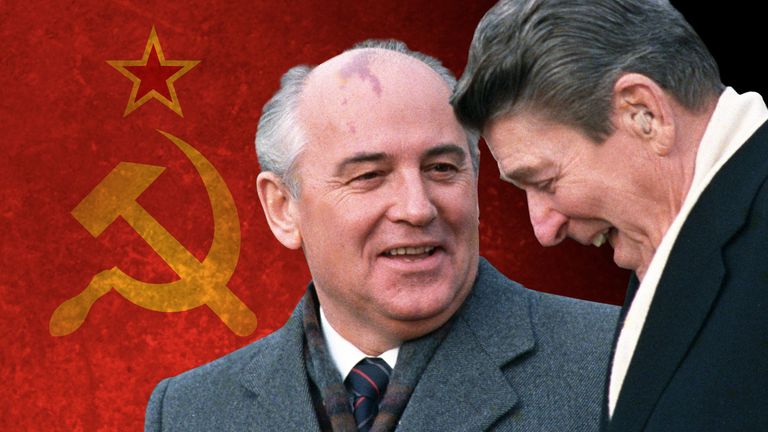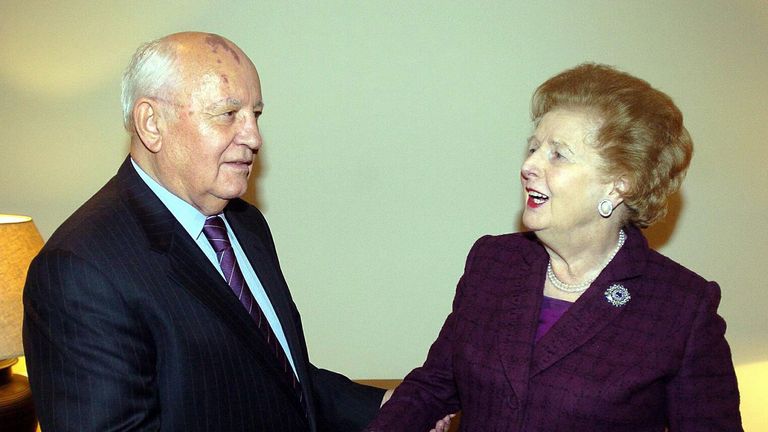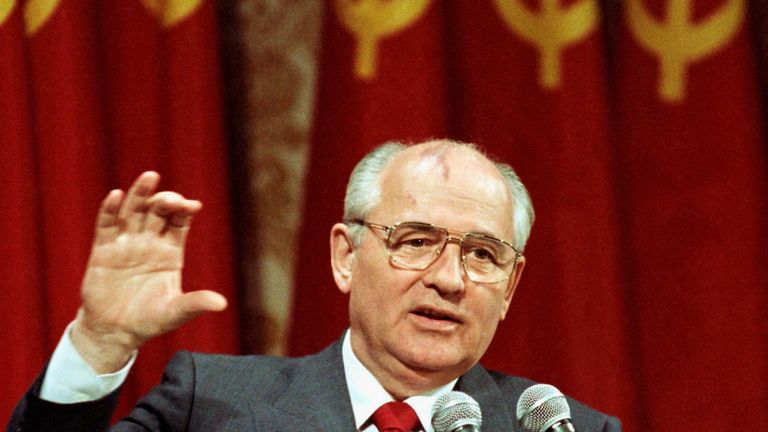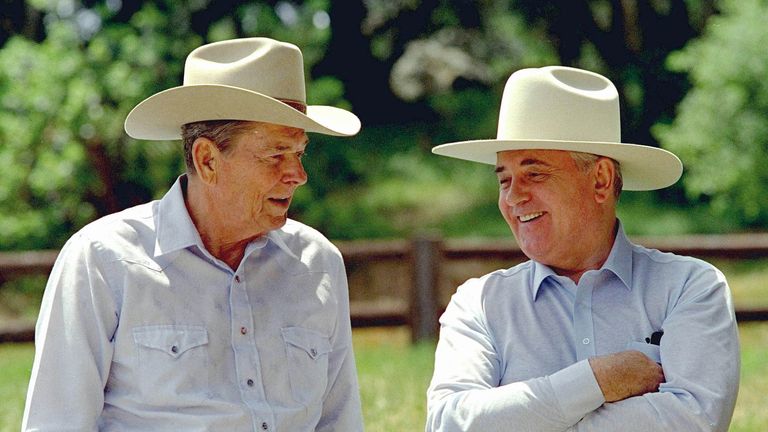A love troika: For Reagan and Thatcher, Gorbachev was the man the West could do business with
The former Soviet president was a valued ally of successive British prime ministers - which helped towards a glittering diplomatic prize.
Wednesday 31 August 2022 15:32, UK
Mikhail Gorbachev was courted by Margaret Thatcher and Ronald Reagan in the 1980s as between them they plotted the ending of the Cold War.
It was a question of the right people in the right place at the right time and their co-operation dramatically changed the international landscape.
Jon Craig, chief political correspondent
Even before he became leader of the old Soviet Union, Mrs Thatcher described Gorbachev as "a man one could do business with". And she did, along with her ideological soulmate, Ronald Reagan.
Her courtship began when Mr Gorbachev made a visit to the UK in 1984, at a time when he was expected to be the USSR's next head of state.
Mrs Thatcher desperately wanted to improve personal relations with him and the Soviet Union.
Many will see it as tragic that the warm relations with Mr Gorbachev she achieved during the 1980s, leading to the ending of the Cold War, the collapse of the Berlin Wall and the creation of modern democracies in Eastern Europe, have now been left in tatters by President Putin's brutal war in Ukraine.
Tributes to man who brought about the end of the Cold War - live updates
Mrs Thatcher literally rolled out the red carpet for Mr Gorbachev during that visit to the UK in 1984, hosting him at Chequers. He was then Number 2 in the Soviet Communist Party hierarchy.
Later, at the funeral of President Chernenko, Mr Gorbachev's predecessor, in 1985, she told the new president his visit had been one of the most successful ever by a major world leader.
No British prime minister had more meetings with a Soviet leader than Mrs Thatcher did with Mr Gorbachev. Not even her hero Winston Churchill with his wartime ally Josef Stalin.
The result was the glittering diplomatic prize of the thawing of the Cold War, for which Mrs Thatcher and Mr Gorbachev must take enormous credit.
Mark Stone, US correspondent
He was the last of the Soviet leaders and one so starkly different from those who came before him. "Decent", "humane", "brave" - some of the most-used adjectives in the West, for the man who took a leap and literally changed the world. Under his watch, over just five heady years, the world map was redrawn.
Even his nickname evokes a certain fondness - 'Gorby'. But of course the truth is reflections of the man and the thrust of his legacy will differ.
His obituary, written in London, will be similar to that written here in Washington. In the Baltic states, who once watched Gorbachev's tanks roll in, it will read a little differently. And in Moscow, some of the reflections will be of a different man altogether; an alternative legacy.
In his 1991 resignation speech he declared that under his perestroika reform programme, society "had acquired freedom". He's certainly the West's hero; he freed eastern Europe and put Germany back together.
Or, was he the man who lost an empire? It's one that Putin wants to put back together again. Different histories in different places.
But it's from the images of the time that you get a sense of a remarkable person and a remarkable time, whichever version of history you are reading.
An image of him with Ronald Reagan said so much for me. Taken at Reagan's ranch in California, both men sporting cowboy hats, it nods to a different era.
In their smiles was the unlikely rapport between the capitalist and the communist; two men who navigated two superpowers back from the brink, through the Cold War and out the other side.
On 25 December 1991, Gorbachev resigned as the leader of the USSR and handed control of the Russian nuclear arsenal to his successor Boris Yeltsin. It's said that he told Reagan's successor George HW Bush: "You can have a very quiet Christmas evening."
The threat had gone, the Cold War was over. Or so we thought. How times have changed.



